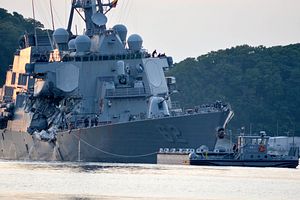At the Washington Navy Yard on Tuesday, a junior officer from the USS Fitzgerald pleaded guilty to dereliction of duty in a special court martial for her role in the Japan-based destroyer’s collision last summer.
The lieutenant junior grade was the officer of the deck in charge of the ship’s safe navigation when it was struck by the ACX Crystal while transiting at high speed across a busy shipping lane southwest of Tokyo Bay last June, resulting in the drowning deaths of seven sailors. The subsequent Navy investigation determined that the collision was “avoidable” and that the watchteam led by the junior officer failed to adhere to standard safe navigational practices and failed to notify the ship’s captain of dangerous situations as required.
The junior officer initially faced charges including negligent homicide, dereliction of duty, and hazarding a vessel, but reached a plea arrangement with Navy prosecutors on the lesser charge of dereliction of duty at a special court martial, which is limited in the punishments that it can award. The Navy judge ordered the officer’s pay reduced by half for three months and she will receive a punitive letter of reprimand. Officers cannot be sentenced to confinement – prison – or dismissed from military service in special courts martial. There are several administrative actions that could still dismiss the officer from the Navy, but the punitive letter of reprimand effectively ends her career in any case because it means she will not promote to a higher rank.
At her sentencing hearing, both defense counsel and prosecutors indicated that the officer received little needed support from more senior officers on board and that conditions on the ship beyond her responsibility contributed to the tragedy. The navigational track that the junior officer was ordered to follow disregarded the direction of the prevailing shipping traffic, and the navigational charts she was provided did not show that they were crossing a published marine traffic lane. She was also ordered to transit at extremely high speeds, over 20 knots, which drastically reduced the time she would have had to react to unsafe situations in the busy traffic lane. The officer’s ability to appreciate the severity of her situation and make appropriate decisions was compromised because her primary navigational radar did not function correctly and the sailor operating the backup radar was inadequately trained in its use.
While the junior officer was primarily responsibility for the ship’s safety that night, these broader issues suggest why prosecutors still seek charges against three more senior officers on the Fitzgerald, and the officer of the deck’s plea deal may indicate that prosecutors want her testimony against them. Two lieutenants will receive hearings on May 9 that may send them to a general court martial, which can award the full range of punishments, on charges of negligent homicide, hazarding a vessel, and dereliction of duty. The Fitzgerald’s captain faces a similar hearing later in May. The ship’s second in command was issued a letter of reprimand in an non-judicial administrative hearing overseen by a senior Admiral earlier this year.
When the Japanese Coast Guard completed their investigation into the collision last March it recommended charges of negligent homicide against two officers on the Fitzgerald, determining that the officers were maneuvering the destroyer in contravention of the international “rules of the road.” However, Japanese authorities declined to press the charges because the Status of Forces Agreement that governs U.S. personnel in Japan gives the United States the right to exercise jurisdiction over acts committed in the course of their military duties.
The heavily damaged destroyer will undergo repairs for at least two years at a shipyard in Mississippi before returning to service and it could take another year or two after that before the ship is certified to deploy operationally again.
































